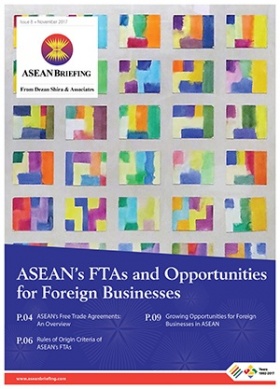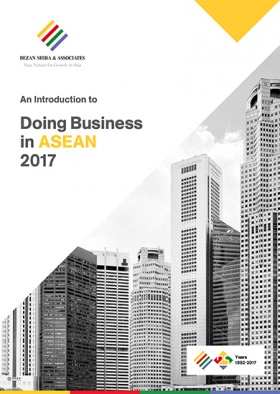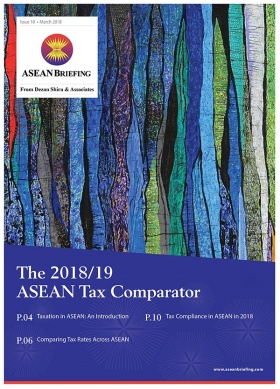Rules of Origin Criteria of ASEAN’s Free Trade Agreements
By Dezan Shira & Associates
Editor: Vasundhara Rastogi
Rules of Origin (RoO) are guidelines that help importers and manufacturers determine the country of origin of a product. RoOs establish the product’s eligibility for preferential tariff treatment available under FTAs. In other words, products qualifying as originating under a FTA may be allowed to pay lower or no import tariff when imported into another FTA member country.To qualify as originating goods, imported items must either be:
- Wholly-obtained or produced entirely in an FTA member country; or
- Must have undergone a ‘substantial transformation’.
For the goods that are partially produced within an FTA member country, substantial transformation guarantees that a meaningful manufacturing process has taken place in the free trade area for the good to qualify as originating. The criteria to determine the country of origin for such goods is based upon three methods as explained below.
![]() RELATED: Pre-Investment and Market Entry Advisory from Dezan Shira & Associates
RELATED: Pre-Investment and Market Entry Advisory from Dezan Shira & Associates
- Regional Value Content (RVC)
RVC requires that a certain percentage of the good’s value must originate in a FTA member country for the good to be considered as originating. Under ASEAN’s FTAs, this percentage is generally 40 percent of the Free on Board (FOB). FOB is the price actually paid or payable to the exporter for a good when the good is loaded onto the carrier at the named port of exportation, including the cost of the good and all costs necessary to bring the good onto the carrier.
- Change in Tariff Classification (CTC)
To qualify as originating under the CTC rule, the non-originating material used in the production of the good must not have the same HS classification as the final good. Manufacturers and exporters must know the HS classification of the final good and the non-originating raw materials to use this method.
- Specific Process Rule (SPR).
This is usually applicable for chemical goods. The goods are considered as originating only if it is produced through a specific chemical process that occurred in a FTA member country. The origin criteria for a good can be one or a combination of these methods. In addition, some goods may have two or three co-equal alternative origin criteria; this allows the exporter or manufacturer to select the origin criteria which best suits the production of his good. It is important to note here that the origin of these goods is dependent on the country where the last substantial transformation is performed.
Rules of Origin criteria under the ASEAN FTAs
Essentially, for different FTAs, different RoO systems and requirements exist in terms of the methods used to determine the origin of the good. RoOs criteria for ASEAN’s FTAs are given in the table below.
Certificate of Origin
In all cases, regardless of the substantive criteria used for meeting the origin requirement, exporters belonging to a FTA member country must obtain a relevant certificate of origin (CO) for each shipment; verifying the origin of the product to take advantage of the tariff concessions available under the FTA and gain greater market access.
The importers of the products in a FTA member country must also ensure that their suppliers understand the FTA protocol and include the appropriate documentation with their shipments. The preferential CO is issued by the exporting FTA partner country to the exporter or manufacturer and proves to the importing FTA partner country that the imported good meets the relevant rules of origin.
Certification Procedure
Factory Registration
Exporters or Manufacturers wishing to acquire the certificate of origin must first apply for registration using the stipulated form (see table below). Upon registration, customs agency inspects the applicant’s factory to check on the production process, and confirm manufacturing operations, machinery and manpower, and updated production records.
 RELATED: ASEAN-Hong Kong Free Trade Agreement Signed
RELATED: ASEAN-Hong Kong Free Trade Agreement Signed
Prepare manufacturing cost statement
Manufacturers must prepare manufacturing cost statement (MCS) for each product in order to prove local value content and/or change in tariff heading meets the RO as stated in respective FTA. MCS is usually valid for one year.
Apply for Preferential Certificate of Origin
After MCS approval, the manufacturer must apply for preferential CO for each shipment. The preferential CO is usually valid for one year. The manufacturer must then sign the CO and send the original copy to the importer, for the importer to claim tariff concession. CO can be obtained from the respective authority in each FTA country.
|
|
|
About Us
ASEAN Briefing is produced by Dezan Shira & Associates. The firm assists foreign investors throughout Asia and maintains offices throughout ASEAN, including in Singapore, Hanoi, Ho Chi Minh City and Jakarta. Please contact us at asia@dezshira.com or visit our website at www.dezshira.com.
- Previous Article The Philippines’ Investment Outlook for 2018
- Next Article Philippine Labor Contracts: What You Need to Know










